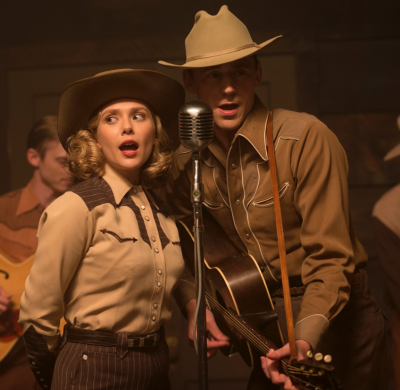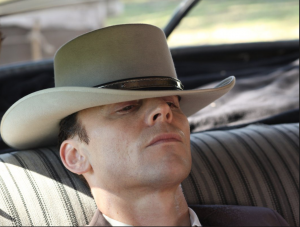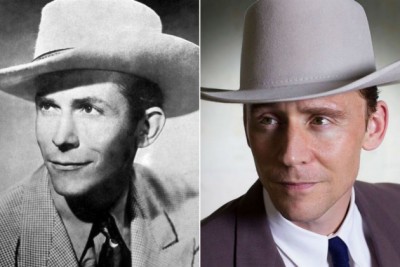 “I Saw the Light,” the new biopic about Hank Williams, begins with three disjointed moments. A snippet of a faux-archival interview with the country western singer’s publisher, Fred Rose (Bradley Whitford), shifts to Williams (Tom Hiddleston), bathed in dusty light and singing a cappella on an empty stage, and then lurches to his quickie wedding to freshly divorced single mother Audrey (Elizabeth Olsen) at an Alabama gas station.
“I Saw the Light,” the new biopic about Hank Williams, begins with three disjointed moments. A snippet of a faux-archival interview with the country western singer’s publisher, Fred Rose (Bradley Whitford), shifts to Williams (Tom Hiddleston), bathed in dusty light and singing a cappella on an empty stage, and then lurches to his quickie wedding to freshly divorced single mother Audrey (Elizabeth Olsen) at an Alabama gas station.
It’s an opening sequence that doesn’t add up to the sum of its parts, which, alas, can be said across the board of this much-anticipated adaptation of Hank Williams: The Biography by Colin Escott with George Merritt and William MacEwen. Focusing on the singer’s struggles with alcoholism and promiscuity (whiskey and women, who are we kidding?), it takes up his story when he’s a local radio station singer whose bride is chomping at the bit to join him at the microphone. Since her voice is not exactly of June Carter Cash caliber, this causes as much tension in their young marriage as his heavy boozing does.
Olsen plays Audrey as a hard little thing, with a jutting jaw and blue eyes perpetually narrowed in calculation. Managing her husband’s career, she lands Williams on the radar of Rose, who immediately signs the singer and opens other doors for him. But though the film doesn’t shy away from the utility of her ambition, it extends her no sympathy. Instead, it intimates that she’s a unilaterally bad woman, an unnatural woman; her decision to abort their second child due to her husband’s sex and drug addictions is presented as a brutal attack on Williams, for example. Olsen, who usually transcends limited material with an old-soul solemnity (see: “Liberal Arts”), is depressingly one-note here – literally and figuratively.
Depressingly one note is the name of the game in “I Saw the Light.” Drawing on a visual palette of leather and suede shades, its mid-century American South is drearily monotonical, down to a unilateral Whiteness: The fact that Williams was trained by the black street performer Rufus Payne (Williams called him “my only teacher”) is never referenced, nor is his love of “spiritual music.” For that matter, though Williams’s proprietary mother, Lillie (Cherry Jones, also uncharacteristically two-dimensional), looms in doorjambs and through shuttered windows, we don’t learn how she and Williams’s absent father may have contributed to his depression and alcoholism. You could argue we’re well off without such dime-store psychologizing, but since the accent is on Williams’s dysfunction, it’s wrong-headed and, worse, dull to depict it without shedding any light on the cause.
The English Hiddleston, known best in the United States for his turns in Marvel multiplex fare, does his manly best. Channeling the broken charisma of Williams with an easy grin, he has mastered the singer’s Blue County drawl as well as the art of acting drunk. (Do they teach playing blotto in elementary schools across the pond?) Like Joaquin Phoenix as Johnny Cash in “Walk the Line,” he doesn’t necessarily sound like Williams (whose voice was higher and more heartbreaking) but his singing stirs us anyway, as do his bright, hurt eyes. That Williams is kept at a distance from us seems less the actor’s fault than that of the narrative structure.
Even when Williams fulfills his lifelong dream of making it to the Grand Ole Opry and starts to score number-one hits, we don’t get a tangible sense of him as an artist. We never see him write a song; we rarely see him perform. The emphasis is on him flaking on gigs rather than playing at them, which, as Williams might have put it , is a crying shame – especially since this film only comes alive in the rare scenes that highlight his music. The impulse to hone in on the man behind the mirror is an understandable one, but one of these days someone is going to wise up and make a music biopic that focuses on what actually distinguishes their subject. Through the history of humankind, there have always been plenty of no-account, whoring boozehounds. But there was only one Hank Williams, who, in his twenty-nine years on earth, made enough plaintive, beautiful music to fill many lifetimes. Guess we’ll have to keep waiting for the film that introduces us to that man.
, is a crying shame – especially since this film only comes alive in the rare scenes that highlight his music. The impulse to hone in on the man behind the mirror is an understandable one, but one of these days someone is going to wise up and make a music biopic that focuses on what actually distinguishes their subject. Through the history of humankind, there have always been plenty of no-account, whoring boozehounds. But there was only one Hank Williams, who, in his twenty-nine years on earth, made enough plaintive, beautiful music to fill many lifetimes. Guess we’ll have to keep waiting for the film that introduces us to that man.
This originally appeared on Signature.
